Showing 11 - 20 of 72 posts found matching keyword: history
Tuesday 12 May 2020
Partial transcript of press briefing by the ACTUAL President of the United States on May 11, 2020:
Q: Mr. President, in one of your Mother's Day tweets, you appeared to accuse President Obama of "the biggest political crime in American History, by far." Those were your words. What crime exactly are you accusing President Obama of committing, and do you believe the Justice Department should prosecute him?PRESIDENT: Obamagate. It's been going on for a long time. It's been going on from before I even got elected, and it's a disgrace that it happened, and if you look at what's gone on and you look at now all of this information that's being released and from what I understand, that's only the beginning. Some terrible things happened, and it should never be allowed to happen in our country again. And you'll be seeing what's going on over the next — over the coming weeks, and I wish you would write honestly about it. But unfortunately you choose not to do so.
Yeah, John, please.
Q: What is the crime, exactly, that are you accusing him of?
PRESIDENT: You know what the crime is. The crime is very obvious to everybody. All you have to do is read the newspapers. Except yours.
He keeps using that word, "crime." I don't think it means what he thinks it means.
(I also don't think he can read, but that's a different issue.)
Seriously, we are well into year three of this bullshit, and it still blows my mind that the so-called leader of the free world can stand in his front lawn and say dumb shit like this and everyone acts like it's business as usual.
If there's anything that should never be allowed to happen in our country again.... You know what it is.
Comments (0) | Leave a Comment | Tags: crime history news politics trumps america
Thursday 16 April 2020
Press Briefing by President Franklin Roosevelt, issued on March 11, 1941:
MR. ROOSEVELT: Thank you very much. Please.
I salute the American people for following our guidelines on global distancing — even you people. It's so different looking out there when I look at you. Their devotion, your devotion is saving lives.
Today I'm instructing my administration to deny Lend-Lease Act funding for Britain while a review is conducted to assess the British role in severely mismanaging and covering up the spread of Nazism. Everybody knows what's going on there.
American taxpayers provide between $250 million and $300 million per year in ships to Britain. In contrast, the Allied nations contribute even less. As an independent nation, the United States has a duty to insist on full accountability.
One of the most dangerous and costly decisions from Britain was its disastrous decision to appease Germany's annexation of Czechoslovakia and other nations. We were very much opposed to what they did. Fortunately, I was not convinced and suspended travel from Europe, saving untold numbers of lives. Thousands and thousands of Americans would have died in their war.
Since its establishment in 1776, the American people have generously supported the British to provide better outcomes for the world and, most importantly, to help prevent global crises. With the outbreak of the Nazi pandemic, we have deep concerns whether America's generosity has been put to the best use possible.
Had Britain done its job to get experts into Germany to objectively assess the situation on the ground and to call out Germany's lack of transparency, Nazism could have been contained at its source, with very little death — very little death — and certainly very little death by comparison. This would have saved thousands of lives and avoided worldwide economic damage.
Instead, the British willingly took Germany's assurances to face value, and they took it just at face value and defended the actions of the German government, even praising Germany for its so-called transparency. I don't think so. The British pushed Germany's misinformation about the violence, saying it was not communicable and there was no need for travel bans. They told us, when we put on our travel ban — a very strong travel ban — there was no need to do it. "Don't do it." They actually fought us.
We will continue to engage with Britain to see if it can make meaningful reforms. For the time being, we will redirect military support and directly work with others. All of the aid that we send will be discussed at very, very powerful letters and with very powerful and influential groups and smart groups — militarily, politically, and every other way.
And, with that, if you have a few questions, we'll take them. And if not, that would be okay too.
Q: Mr. President, two questions. First, on your announcement about Britain, I understand your grievances with them. But can you address why it is the correct time to do this now in the middle of a war?
MR. ROOSEVELT: Well, we're going to be dealing with countries and we're going to be dealing with leaders of different parts of the world. We spend $300 million a year. We have for many years — more, far more, than anybody else, including Germany. We shouldn't be the only arsenal of democracy.
And it is very Germany-centric. I told that to Fuhrer Hitler. I said, "The United Kingdom is very Germany-centric." Meaning, whatever it is, Germany was always right. You can't do that. You can't do that. Not right. And we spend — and again, it's not a question of money. But when we're spending $300 million and Germany is spending $38 million, $34 million, $40 million — $42 million, in a case. It's — again, not money, but it's not right.
Q: Back to Britain, will you support the country again, if Churchill is immediately replaced? Or do you want to see him step down as a possible reform?
MR. ROOSEVELT: Well, we're doing an investigation. I — I don't know the gentleman, but I know there have been problems. And it's been very unfair to the United States — just like the League of Nations has been very, very unfair, and now they're coming into line. When they consider Germany a developing nation, and because Germany is a developing nation, they take massive advantage of the United States? Why didn't other Presidents stop this? I've been talking about it from the day I got in, and we're looking at that very, very strongly. So I have a problem with Britain and League of Nations, both of them. I'm not sure which is worse, if you want to know the truth, but we'll figure it out. Okay?
Q: You were just criticizing Britain for praising Germany as transparent, but you were saying many of the same things about Germany just a couple of months ago. So, I mean, how do you square, your decision to revoke funding?
MR. ROOSEVELT: Well, I did a reparations deal with Germany, where Germany is supposed to be paying $27 billion to our country. We're going to be watching very much to see. Now, it got a little bit waylaid by the war.
But, look, I'd love to have a good relationship with Germany. But if you look — and we made a phenomenal deal. Germany has paid — because of me, Germany has repaid us tens of billions of dollars over the course of a very short period of time. Billions of — some of that money has been spent to farmers, where they were targeted by Germany. We cannot let that happen. We can't let that happen.
Q: Mr. President, I have a quick follow on Britain. The question is if—
MR. ROOSEVELT: I told them when they put this guy here, it's nothing but trouble. He's a showboat.
Q: I'm just trying to ask you a question.
MR. ROOSEVELT: If you keep talking, I'll leave—
Q: I'm just trying to ask a question.
MR. ROOSEVELT: — and you can have it out with the rest of these people.
Q: I'm just trying to ask a question. I'm just—
MR. ROOSEVELT: If you keep talking, I'm going to leave and you can have it out with them.
Q: It's a simple question.
MR. ROOSEVELT: Just a loudmouth.
Q: You're criticizing Britain for appeasing Germany for being transparent, but you also praised Germany for being transparent in January.
MR. ROOSEVELT: I don't talk about Germany's transparency.
Q: In January, there was a fireside chat.
MR. ROOSEVELT: Well, you know, if I'm so good to Germany, how come I was the only person — the only leader of a country that closed our borders tightly against Europe?
Q: I'm talking about how you said they were transparent.
MR. ROOSEVELT: And, by the way, when I closed our border, that was long ahead of what anybody — you can ask anybody that was in the room. Twenty-one people. I was the one person that wanted to do it. Eleanor can tell you that better than anybody. I was the one person that wanted to do it. You know why? Because I don't believe everything I hear, and I closed. And if we didn't close our border early — very early, long before the kind of dates you're talking about — we would have had thousands and probably hundreds of thousands more death.
Please.
Q: I'm talking about how you said—
MR. ROOSEVELT: Please. That's enough. Thank you.
END
Comments (1)
| Leave a Comment | Tags: covid19 great speeches in history history news politics trumps americaThursday 12 March 2020
Says the President of the United States in a live address to the American people at 9PM EDT:
We will be suspending all travel from Europe to the United States for the next 30 days. The new rules will go into effect Friday at midnight. These restrictions will be adjusted subject to conditions on the ground. There will be exemptions for Americans who have undergone appropriate screenings, and these prohibitions will not only apply to the tremendous amount of trade and cargo, but various other things as we get approval.
Says the President of the United States in a tweet to the American people at 10:15PM EDT:
Hoping to get the payroll tax cut approved by both Republicans and Democrats, and please remember, very important for all countries & businesses to know that trade will in no way be affected by the 30-day restriction on travel from Europe. The restriction stops people not goods.
The takeaway: The President of the United States revealed on television that we trade people.
While I'm glad that he's finally taking a global pandemic seriously, I wish it wasn't the Cholera pandemic of 1849.
Comments (0) | Leave a Comment | Tags: covid19 death history illness news trumps america
Wednesday 4 March 2020
When I was a kid, we used to laugh about how old and out of touch Ronald Reagan was. Hard to believe that he was only in his 60s when he became president.
In its nearly quarter-millennium history, the United States has had exactly one president who was older than 70 when he took office. He's still our current president.
Considering who is still in the running for the next term, the next president is guaranteed to be older than 70 when he takes office.
I'm sure that having back-to-back septuagenarian presidents for the first time in American history must say something about something, but I'll be damned if I know what it is.
Maybe I'll figure it out in thirty more years.
Comments (1)
| Leave a Comment | Tags: history politics trumps americaTuesday 7 January 2020
In 1914, the countries of Serbia and Austria-Hungary were at each other's throats as they vied for political dominance in their overlapping spheres of influence.
Prince Regent Alexander of Serbia assumed control of his ill father's crown on June 24, 1914. Heir to the Austrian throne, Archduke Franz Ferdinand, was assassinated by Serbian-recruited agents four days later.
Though no one could have predicted the horrors the future held for the two countries that started The War to End All Wars, the assassination was particularly unexpected considering that just a few years prior, Alexander had criticized his predecessor's own ulterior motives for war in this response to a question from his national press:
My father will start a war with Austria-Hungary because he has absolutely no ability to negotiate. He's weak and ineffective. We have a real problem in the kingdom. So, I believe that he will attack Austria-Hungary sometime prior to the end of his reign because he thinks that's the only way he can maintain power. Isn't it pathetic?
Because that's how grown-ups talk.
Comments (1)
| Leave a Comment | Tags: history news trumps america warWednesday 13 November 2019
I'm one of those people who, back in 2018, was reluctant to impeaching the sitting President because there was no way the Senate would do anything.
I'm also one of those people who, even though the Senate probably still won't do anything, has become convinced that impeachment is a necessity in the wake of the sitting President actively soliciting extorting outside influence on the 2020 election.
I'm bothered that a not insignificant portion of America continues to support the President's interest in subverting the democratic rule of law. I want to give my fellow countrymen the benefit of the doubt. I hope it's a simple case of ignorance, either about the law or about what the President admits that he did.
Late in his life, Thomas Jefferson explained that he wrote the Declaration of Independence
"to place before mankind the common sense of the subject, in terms so plain and firm as to command their assent."
Obviously, that worked out pretty well*. May the inevitable Articles of Impeachment be just as successful.
*John Adams rather famously estimated that up to a third of the American population resisted Independence until the bitter end. In any era, some minds can't be changed.
Comments (1)
| Leave a Comment | Tags: history news politics rant trumps america walterFriday 18 October 2019
Press Briefing by President George Washington, issued on April 8, 1793:
MR. WASHINGTON: Hey, guys. How are you all?
So we're going to talk about French Minister Genet. We're going to announce today that we're going to meet Citizen Genet on May Eighteenth at the Mount Vernon facility in Fairfax County, Virginia.
Now, let's talk about the site selection process because I know you folks will ask some questions about that. How do we go about doing this? First of all, we use a lot of the same criteria that have been used by presidents of the Confederation Congress. There's a long list of the accommodations on site: the ballrooms, bilateral rooms, the number of rooms, the portrait ops, the support lodgings that are there, the proximity to cities and seaports, carriage boarding zones, medical facilities, et cetera.
So we use the same set of criteria that previous administrations have used. We started with a list of about a dozen, just on parchment. And we sent an advance team out to actually visit ten locations in several states. We visited Connecticut, Pennsylvania, South Carolina, New Jersey, Maryland, and Massachusetts. Now, we got that list down to just under ten, and the advance team went out to visit those. And from there, we got down to four finalists that our senior team went out to look at. They looked at — I think it was one in Maryland, two in New Jersey, and then the Pennsylvania State House facility in Philadelphia.
And it became apparent at the end of that process that Mount Vernon was, by far and away — far and away — the best physical facility for this meeting. In fact, I was talking to one of the advance teams when they came back, and I said, "What was it like?" And they said, "George, you're not going to believe this, but it's almost like your father built this facility to host this type of event." If any of you have been there, you know that there's separate buildings with their own rooms, separate and apart from each building, so that one country can have a building, another country can have another, you folks could have your building for the press. And obviously, the common areas are going to be perfect for our needs down there.
Anticipating your questions: How is this not an emoluments violation? Am I going to profit from this? I think I have pretty much made it very clear since I arrived here that I don't profit from being here. I have no interest in profiting from being here. It's one of the reasons that I took no salary as Commander-in-Chief of the Continental Army. Will not be profiting here.
I had considered the possibility of whether or not I could actually do it at no cost, to understand there's difficulties with doing it that way. But we'll also have difficulties, obviously, if I charge market rates. So I'm doing this at cost. As a result, it's actually going to be dramatically cheaper for us to do it at Mount Vernon compared to other final sites that we had.
Now, my guess is, with that official part of the briefing finished, there's going to be some questions about a variety of things that are going on in the world.
Q: Yeah, thank you. So, how is this not just an enormous conflict of interest for you to host the French government at your own plantation?
MR. WASHINGTON: Okay, a couple different things. First off, I'm not making any profit. I think we've already established that. I think some —
Q: There's marketing and branding opportunities.
MR. WASHINGTON: It's a huge — I've heard — you know, I've heard that — I've heard that before. You know, I guess I've been the Chief Executive now for about three or four years, and I always hear: Whenever we go to the District of Columbia, it's a huge branding opportunity; whenever I go sleeping anywhere in New England. And everybody asks the question: Is it not a huge marketing opportunity?
I would simply ask you all to consider the possibility that George Washington's brand is probably strong enough as it is, and I don't need any more help on that. This is not like it's the most recognizable name in the English language and probably around the world right now. So, no, that has nothing to do with it.
That's why — listen, I was skeptical. I was. I was aware of the political, sort of, criticism that I'd come under for doing it at Mount Vernon, which is why I was so surprised when the advance team called back and said that this is the perfect physical location to do this.
So, I get the criticisms. Face it: I'd be criticized regardless of what I chose to do. But, no, there's no issue here on me profiting from this in any way, shape, or form.
Q: You said it's going to be done at cost. Do you have any idea of the cost estimate, how much money you're looking at?
MR. WASHINGTON: Yeah, I don't have the numbers in terms of the cost. I do know that it was — it was — one of the ones I saw was, it was almost half as much here. I don't want to butcher the numbers, but it was thousands of dollars cheaper by doing it at Mount Vernon than it was at another facility. And that was roughly fifty percent savings.
Q: Foreign Ministers have been visiting for decades, so how can you make the argument that this is the best place to hold it? Surely there were other places that this could be held. And you can't make the argument that you are not going to profit because we can't know how much you might profit in the future, right?
MR. WASHINGTON: Yeah. To your first point, again, I think the profit one. Again, I'm not making any money off of this, just like I'm not making any money from working here. And if you think it's going to help my brand, that's great. But I would suggest that I probably don't need much help promoting my brand, so we'll put the profit one aside and deal with a perfect place.
Q: I understand that you're trying to put it in a place that you think is the best.
MR. WASHINGTON: Yeah.
Q: And maybe save the taxpayers some money, which is important for all of us. But sometimes you — because of the appearance of impropriety, you don't make that call. Can you at least understand and acknowledge that just the appearance of impropriety makes this wince-inducing and maybe this is something that you want to reconsider?
MR. WASHINGTON: Yeah. I know that. Listen, I — I know the environment we live in. You all know the environment that we live in. And I know exactly that I'm going to get these questions and exactly get that reaction from a lot of people.
And I'm simply saying, "Okay, that's fine. I'm willing to take that." The same way I take it when I go to Valley Forge. The same when I go play at Washington, D.C. I got over that a long time ago. I absolutely believe this is the best place to have it. We're going to have it there. And there's going to be folks who will never get over the fact that it's a Washington property. I get that. But we're still going to go there.
Q: Aside from what your advance team did to look for the perfect place, what role did you play in selecting Mount Vernon, including getting it on the initial list of ten places in the first place?
MR. WASHINGTON: Yeah. I think we — that's a fair question. We sat around one night. We were back in the dining room and I was going over it with a couple of our advance team. We had the list, and I go, "What about Mount Vernon?" And everyone was like, "That's not the craziest idea. It makes perfect sense."
Q: About the Mount Vernon property: Why has no other Foreign Minister meeting ever been held there before?
MR. WASHINGTON: Because they didn't go look at it. So —
I don't know, why did they have it at Federal Hall? I mean, seriously. I mean, for those of you who were there, I'm a little bit familiar with it; I've talked with the folks up at Federal Hall because I was up there recently and asked. I said, "Didn't you guys go up..." — I think it was Lafayette back then. Seventeen Eighty-Three, something like that. And they said it was a complete disaster. I'm like, "Okay, I wonder how that happened. How did that decision get made?"
Q: Just to show the American people that this is above board, are you going to share documents that show how you arrived at this decision with the Congress?
MR. WASHINGTON: No. But I would imagine we would share dollar figures with you afterwards. I mean, that's — that's ordinary course of business.
By the way, you're going to get this answer a lot, okay? I don't talk about how this place runs on the inside. So, if you ask if we — if you want to see our parchment on how we did this, the answer is: Absolutely not.
Q: There will almost certainly be a House Judiciary Committee hearing about this site selection.
MR. WASHINGTON: You think so?
Q: I really think so. Yeah. Will the administration participate, cooperate, with that?
MR. WASHINGTON: You know, that's a — by the way, that's a fascinating question. I had not thought that — that this would prompt a Judiciary Committee investigation. On one hand, I'm thinking to myself, "They don't have time to do it because they're too busy doing the two-party system." Right. And then I think to myself, "No, this is entirely consistent with how they've spent the first twenty-four months in office." Right? Or thirty-six months — however long they've been here. I guess it's been a few years, right?
That, yeah, they'd rather do that than talk about tax policy, than talk about tariffs, than talk about the Whiskey Rebellion; talk about the Jay Treaty. So, that's a fascinating question. I don't know if there will be a Judiciary Committee inquiry into this. My guess is there probably will be. And I look forward to participating in it.
Look, I know we can do this all night. No, I'm not going to take any more. But it's nice — it's nice to see everybody. Thanks again.
END
Comments (1)
| Leave a Comment | Tags: american cincinnatus great speeches in history history news politics trumps americaSunday 25 August 2019
From "The Tower of Prey", The House of Mystery #203, (1972), art by Nelson Redondo:
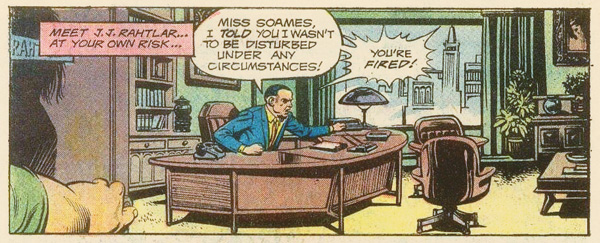
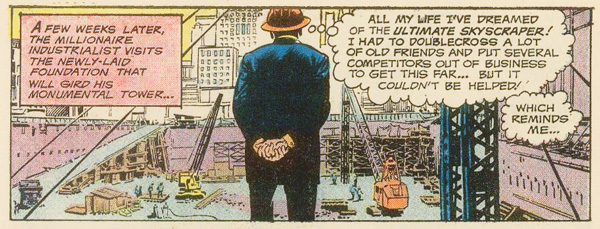
The bomb, wind, bullet, and airplane-proof building at the center of the story appears to be based on the then in-development World Trade Center. The angry woman who blames the greedy developer who "stole" her property has much in common with the landowners who sued the Port Authority of New York/New Jersey over their ability to use eminent domain to seize land from reluctant landlords. Lawsuits lead to the Supreme Court.
You probably know who won in real life. In the comic, it's the landlady's raven-claw curse that carries the day. What a happy ending!
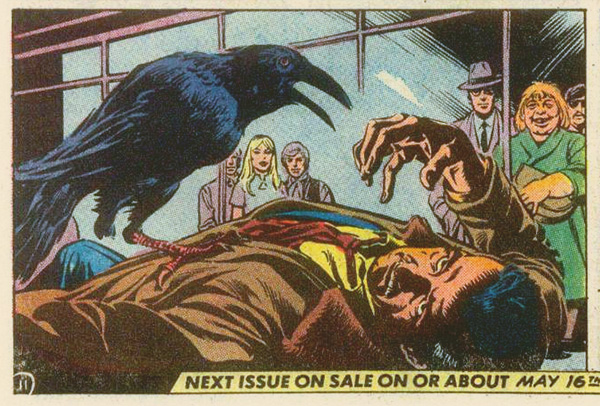
Comments (0) | Leave a Comment | Tags: comic books history trumps america
Saturday 20 July 2019

Comments (0) | Leave a Comment | Tags: comic strip havanese strip history poodle strip poodles television
Wednesday 12 September 2018
Mom found this empty 1942 UGA student football season ticket book in a batch of letters kept by my grandmother:
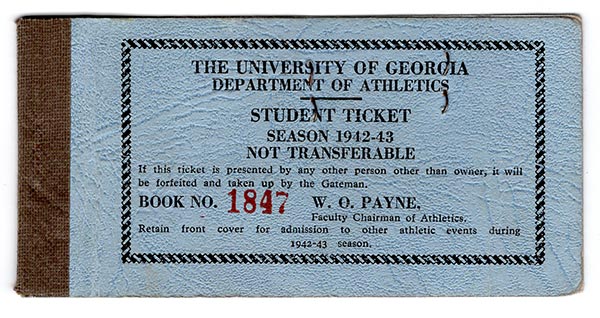
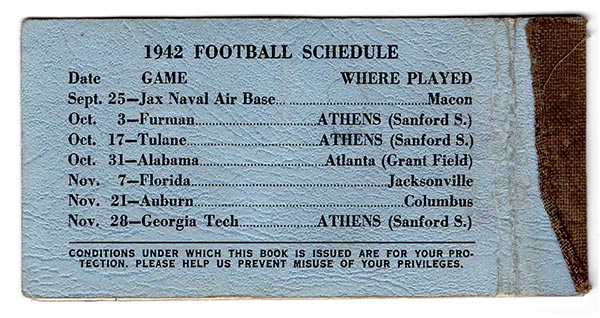
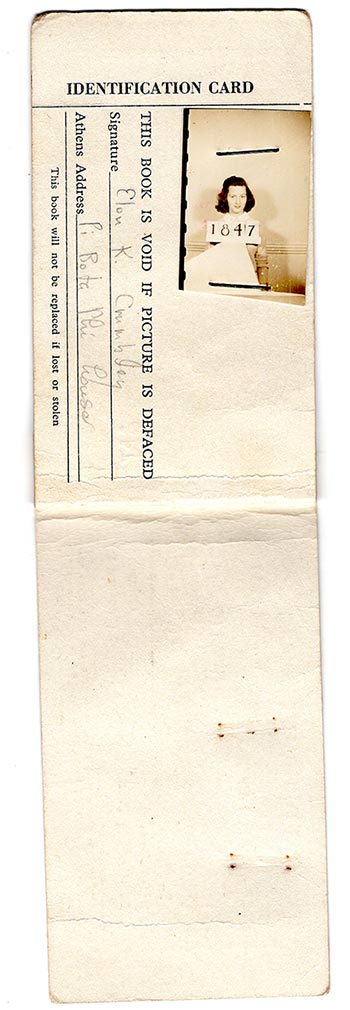
Dink graduated in the class of 1943. Back in her day, students were sold these books of paper tickets (face value of 85¢) redeemable at the box office for a real ticket. Student tickets were only raised to $10 in the 2018 season. To the university's credit, that's less than the price of inflation. (Eighty-five cents in 1942 is over $13 today.) Sanford Stadium has been expanded eight times since 1942, when it only held 30,000 fans. It now seats over 93,000, so I suspect they're making up that lost value in volume.
If an empty ticket book seems like a strange keepsake, keep in mind that UGA won a national title in 1942 behind the incredible backfield tandem of Frank Sinkwich and Charley Trippi. For the record, this was the outcome of those games:
September 25 Jacksonville Naval Air Station, W 14-0,
October 3 Furman, W 40-7,
October 17 Tulane, W 40-0,
October 31 Alabama (ranked #3), W 21-10,
November 7 Florida, W 75-0,
November 21 Auburn, L 13-27,
November 28 Georgia Tech (ranked #2), W 34-0
I never knew that my grandmother attended every home game that season, and Dink died before I went to Athens, so she never knew I would one day have season tickets to our shared alma mater. Maybe, if I'm lucky, I'll eventually get to see a national championship season myself. I think she'd like that.
Comments (0) | Leave a Comment | Tags: family football georgia grandparents history mom

